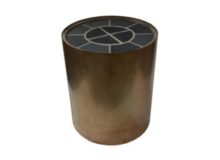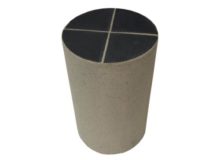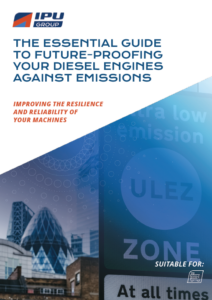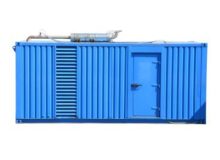Diesel Particulate Filter for gensets (DPF)
IPU’s diesel particulate filters for gensets (otherwise known as DPFs) are aftertreatment devices that act as a physical barrier removing particulate matter from the exhaust stream.
- This is a canned Diesel Particulate Filter
- Here, you can see what the DPF looks like without the can
Why are Diesel Particulate Filters for gensets important?
The UK implementation of the MCP Directive imposes different dust limits (either 10 or 20mg/Nm3) depending on the plant size and date of installation (this does not apply to engines running on gas oil e.g. EN590 Diesel).
IPU’s Diesel Particulate Filters can reduce particulate matter by 95% and offer greater particulate trapping and storage capacity than other filters.
Video: emissions reduction in action
This short video shows our emissions system, consisting of an SCR and a DPF, in action on our genset here at IPU.
The visible reduction in particulate matter thanks to IPU’s DPF is clear to see. If you’d like to experience this reduction in action, register your interest to attend one of IPU’s Emissions Solutions demo days here.
Diesel Particulate Filters will have the biggest focus in Clean Air Zones and also in non-road mobile machinery regulations.
Clean Air Zones aim to address sources of pollution, including particulate matter, with the hope of reducing public exposure to them. London already has a Clean Air Zone, with plans to introduce an Ultra-Low Emissions Zone in April 2019. 5 cities are also required to introduce a Clean Air Zone by 2020; Birmingham, Derby, Nottingham, Leeds and Southampton. Click here for more information on Clean Air Zones.
The non-road mobile machinery regulations are set to control emissions not used on public roadways, including off-road vehicles such as construction and railway vehicles. Mobile gensets are also included. The limit for particulate matter under the NRMM is 0.025g/kWh.
Regenerating your DPF
As particulates accumulate in the filter, it needs to be regenerated (cleaned). There are two modes of regeneration, active and passive.
A heater can be used to regenerate the DPF (active regeneration). Other systems use a Diesel Oxidation Catalyst (DOC) to provide passive regeneration.
Some maintenance to the DPF is still required. Although soot can be regenerated, ash (another type of particulate matter) can’t. It can be removed with a specialist cleaning service provided by IPU (the frequency of this is dependent on engine duty cycle etc).




